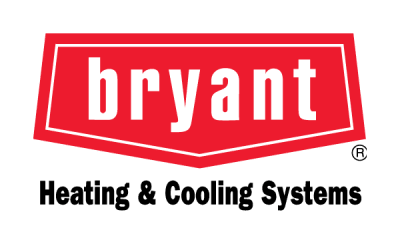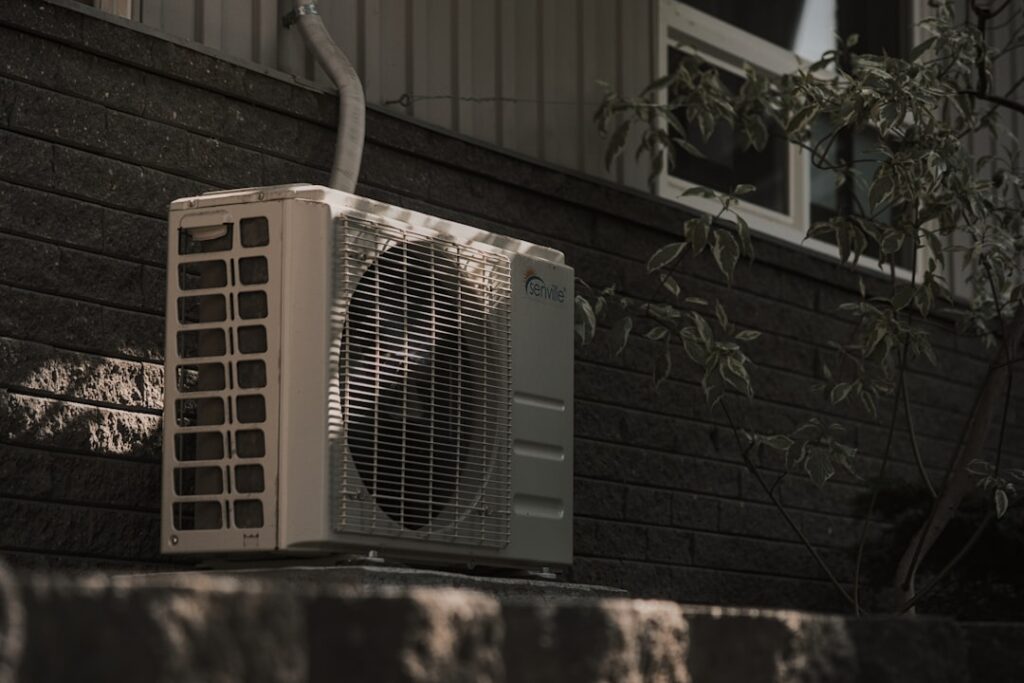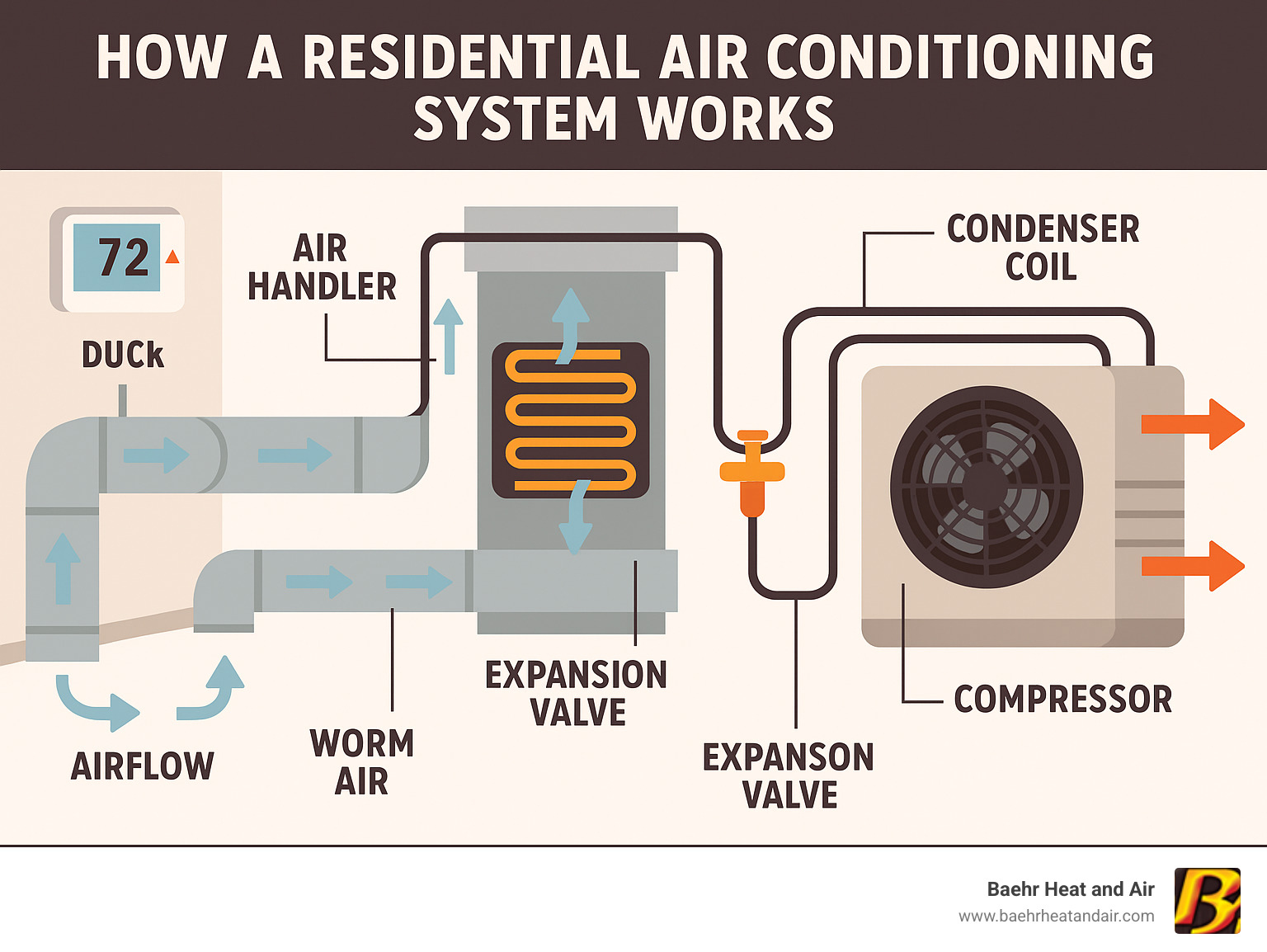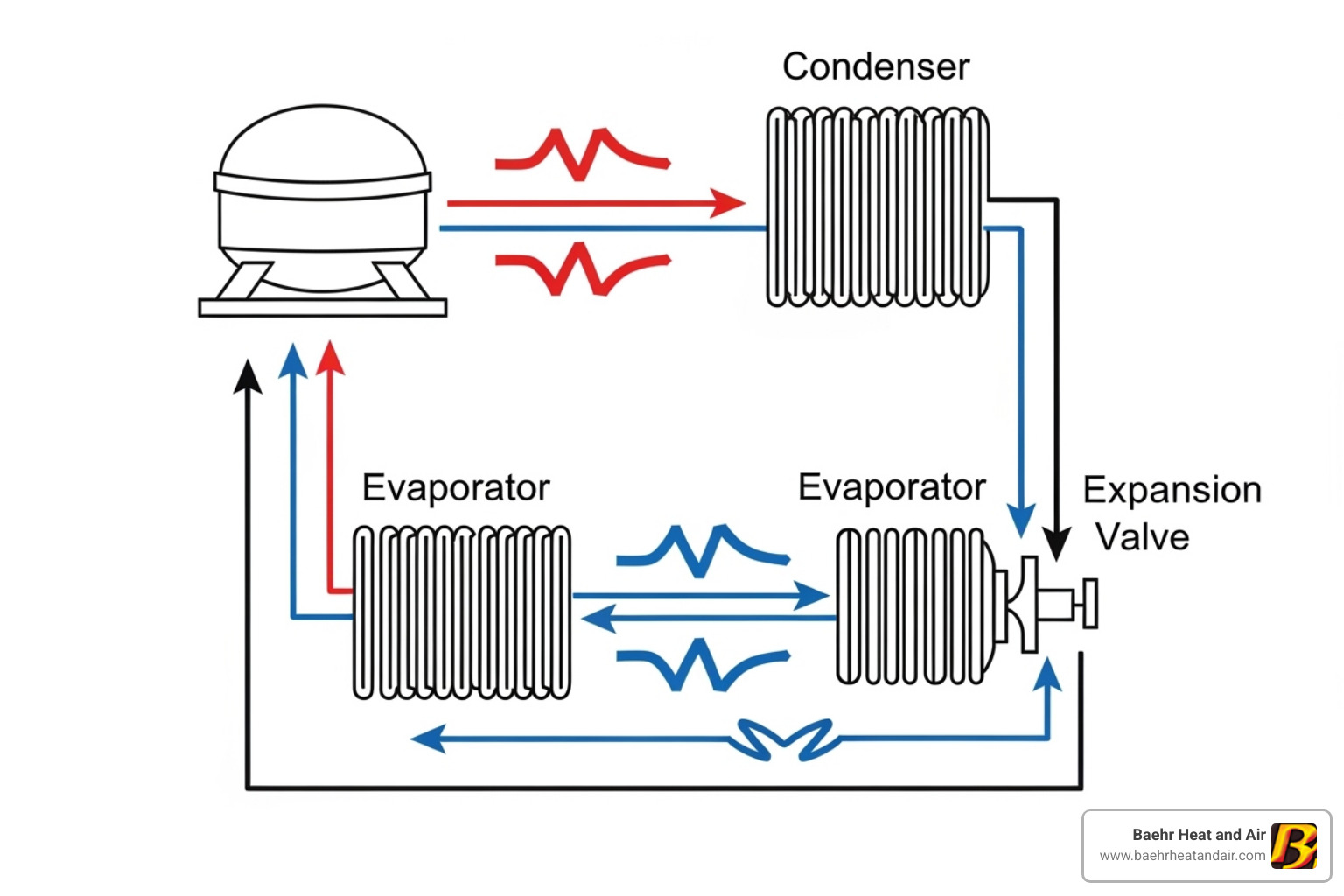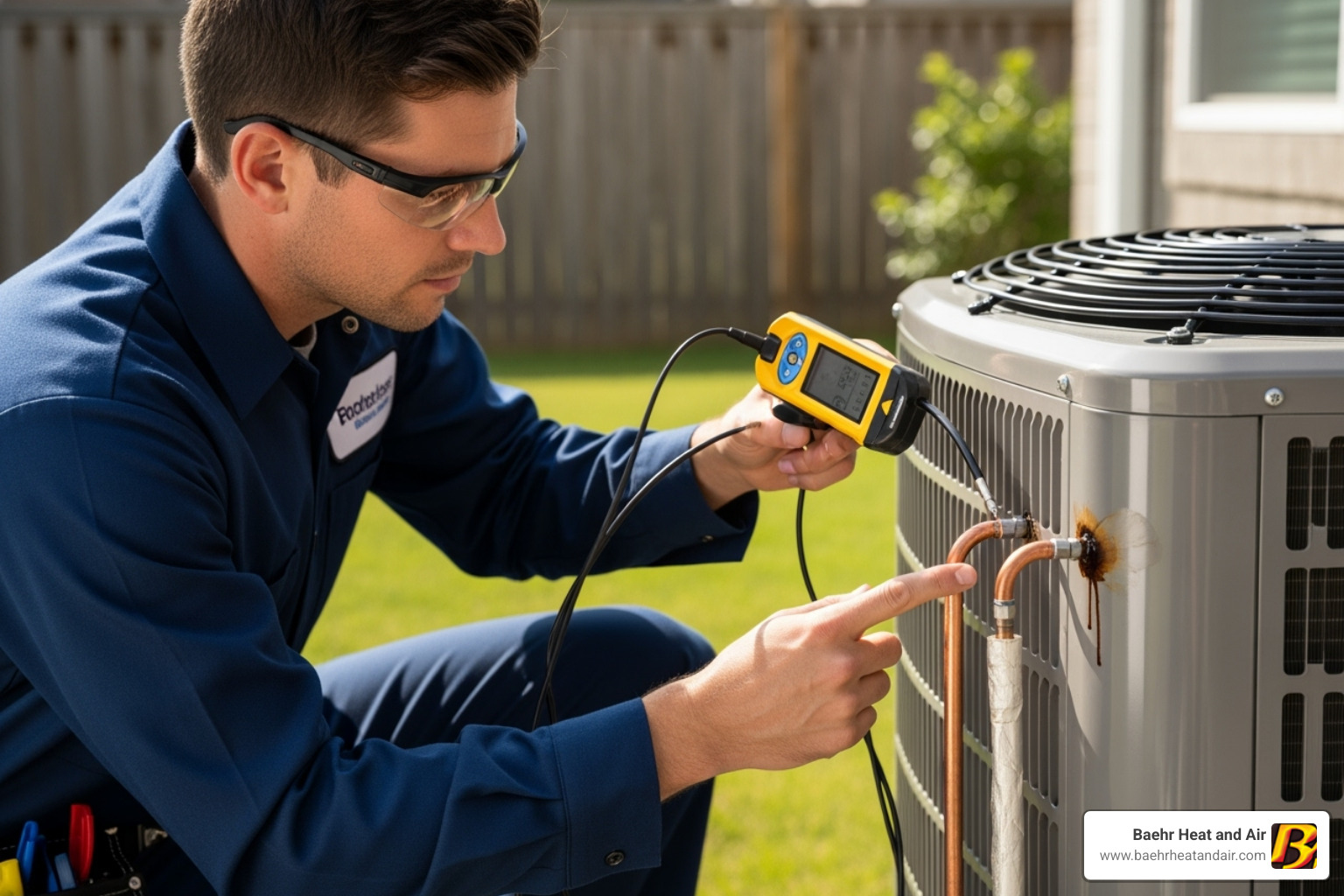Why Lincoln Air Conditioning Knowledge Matters for Every Homeowner
Lincoln air conditioning systems are the backbone of home comfort during California’s scorching summer months. Understanding how your AC works, recognizing common problems, and knowing when to call for help can save you hundreds of dollars and prevent sweltering nights.
Quick Reference Guide for Lincoln AC Systems:
- Main Components: Compressor, condenser, evaporator, expansion valve
- Common Problems: Refrigerant leaks, blocked condensers, electrical faults
- Typical Lifespan: 10-15 years with proper maintenance
- Service Frequency: Annual tune-ups, ideally in spring
- Replacement Signs: Age over 15 years, frequent repairs, R-22 refrigerant
Lincoln’s hot, dry climate puts extra strain on air conditioning systems. Temperatures regularly climb above 100°F during summer, making your AC work overtime to keep your family comfortable. When problems arise – and they will – knowing the basics helps you communicate clearly with technicians and make smart decisions about repairs versus replacement.
The good news? Most AC issues are preventable with regular maintenance and early intervention. Simple tasks like changing filters and keeping the outdoor unit clear can extend your system’s life significantly.
Whether you’re dealing with warm air blowing from vents, strange noises, or sky-high energy bills, understanding your Lincoln air conditioning system empowers you to take action before small problems become expensive emergencies.
How Your Air Conditioner Cools Your Lincoln Home
Picture this: it’s another blazing summer day in Lincoln, and the thermometer is climbing past 100°F. Yet inside your home, you’re perfectly comfortable in a cool 75°F environment. How does this small miracle happen every day?
Your Lincoln air conditioning system doesn’t actually create cold air – that’s a common misconception. Instead, it’s like a heat-moving magician, constantly pulling heat and humidity from inside your home and dumping it outside. Think of it as a one-way ticket for unwanted heat!
The secret lies in something called the refrigeration cycle. Your AC uses a special chemical called refrigerant that has an amazing ability to absorb heat when it changes from liquid to gas, then release that heat when it changes back to liquid. It’s the same principle your refrigerator uses, just on a much larger scale.
The Four Core Components
Every central air conditioning system has four main players working together like a well-choreographed team. When you understand what each one does, those mysterious AC problems start making a lot more sense.
The compressor is your system’s powerhouse – think of it as the engine that keeps everything moving. Located in that big outdoor unit, it squeezes the refrigerant gas under high pressure, which makes it super hot. When your compressor starts failing, you’ll know it. Your AC might make weird clicking or buzzing sounds, or the whole outdoor unit might just refuse to start up.
Next comes the condenser coil, also living in your outdoor unit. This is where all that captured indoor heat finally gets kicked to the curb. The hot, pressurized refrigerant flows through these coils while a fan blows outdoor air across them, cooling the refrigerant down until it turns back into liquid. If this coil gets clogged with dirt, leaves, or debris, your AC has to work much harder to dump that heat.
Inside your home, the evaporator coil does the opposite job. Here, the liquid refrigerant absorbs heat from your indoor air, turning back into a gas in the process. As it steals that heat, the air passing over the coil becomes beautifully cool and less humid. If you ever see ice forming on these coils, something’s wrong – usually low refrigerant or poor airflow.
The expansion valve might be small, but it’s mighty important. This little device sits right before the evaporator coil and controls how much refrigerant flows through. It drops the pressure dramatically, which cools the refrigerant down and gets it ready to absorb more heat from your home.
The Supporting Cast: Thermostat and Ductwork
While those four components handle the heavy lifting, your Lincoln air conditioning system has some crucial supporting players that make everything work smoothly.
Your thermostat is mission control for your entire system. Modern smart thermostats are pretty amazing – they can learn your schedule, adjust temperatures automatically, and even let you control your AC from your phone while you’re stuck in traffic on your way home from work.
Then there’s your ductwork – the highway system that delivers all that beautiful cool air throughout your home. Well-designed and properly sealed ducts are crucial for efficiency. Leaky ducts are like having holes in your garden hose – you’re paying to cool air that never makes it to where you need it.
Good airflow is essential for everything to work properly. When ducts get dirty or blocked, or when vents get covered by furniture, your whole system struggles. For more ways to keep the air in your home clean and healthy, check out our guide on Indoor Air Quality.
Understanding how these parts work together helps you appreciate the engineering marvel that keeps your Lincoln home comfortable, even when Mother Nature is doing her worst outside.
Common Problems with Lincoln Air Conditioning Systems
When your Lincoln air conditioning system starts acting up, it usually gives you warning signs before completely failing. The most common complaints we hear from homeowners include systems that won’t cool properly, mysterious noises coming from inside or outside units, energy bills that suddenly spike, or units that simply refuse to turn on at all.
The good news is that catching these problems early can save you from major headaches and expensive emergency repairs. Most AC issues develop gradually, giving you time to address them before they leave you sweating through a scorching Lincoln summer day. If you’re experiencing any of these problems right now, don’t hesitate to contact us for professional Lincoln AC Repair.
Let’s walk through the most common culprits behind AC troubles so you know what to watch for.
Signs of a Refrigerant Leak
Think of refrigerant as your AC system’s blood – without enough of it, your system simply can’t do its job. Here’s the thing: refrigerant doesn’t get “used up” during normal operation. If your system is low on refrigerant, it means there’s a leak somewhere that needs professional attention.
Hissing or bubbling sounds are often the first clue that refrigerant is escaping from your system. You might hear these noises near the outdoor unit or along the refrigerant lines running to your house.
Oily residue around connections or on AC components is another telltale sign. Refrigerant carries a small amount of oil with it, so wherever you see this oily substance, refrigerant has likely been leaking.
Your system’s reduced cooling performance becomes obvious pretty quickly. The AC might blow air that’s not as cold as usual, or in severe cases, it might blow warm air entirely. This happens because there simply isn’t enough refrigerant to absorb heat from your home’s air.
Frozen evaporator coils might seem counterintuitive, but they’re actually a common sign of low refrigerant. When refrigerant levels drop, the pressure in the evaporator coil changes, causing moisture to freeze on the coil. This ice buildup makes the problem even worse by blocking heat absorption.
Finally, increased electricity bills often accompany refrigerant leaks. Your system has to work much harder and run much longer to achieve even minimal cooling, driving up your energy costs significantly.
Refrigerant leaks require professional attention – the chemicals involved need special handling and certification to work with safely.
Condenser and Fan Issues
Your outdoor unit takes a beating from Lincoln’s weather, debris, and general wear and tear. The condenser coil and fan inside that metal box work together to expel heat from your home, but they’re vulnerable to several common problems.
Blocked condensers are probably the most frequent issue we see. Leaves, dirt, grass clippings, pet hair, and other debris can completely coat the condenser coil, acting like a thick blanket that prevents heat from escaping. When this happens, your AC runs constantly but struggles to cool your home effectively.
Damaged fins on the condenser coil can also restrict airflow. These delicate aluminum fins get bent or crushed easily – sometimes from hail, sometimes from overzealous cleaning with a pressure washer. Even small damage can significantly reduce the coil’s ability to transfer heat.
The fan motor that pulls air over the condenser coil can fail over time. When it does, you might hear grinding or buzzing noises, or the fan might not spin at all. Without proper airflow, the condenser can’t release heat effectively, causing the entire system to overheat and shut down for protection.
An overheating system is the end result of condenser and fan problems. Modern AC units have safety switches that shut the system down when temperatures get too high, but repeated overheating can damage expensive components.
Regular cleaning and maintenance prevent most of these issues. Our Lincoln AC Maintenance service keeps your outdoor unit in peak condition year-round.
Compressor Failure and Electrical Faults
The compressor is the heart of your Lincoln air conditioning system – when it fails, your AC essentially becomes an expensive fan. This vital component pressurizes and circulates refrigerant throughout the system, making the entire cooling process possible.
Compressor problems often announce themselves with loud clicking or buzzing noises from the outdoor unit. You might notice the fan isn’t spinning, or the unit isn’t producing any cool air at all. Compressors can fail due to age, lack of lubrication, electrical issues, or extended periods of inactivity. That’s why we recommend running your AC for a few minutes every month, even in winter, to keep the compressor lubricated and ready for action.
Tripped circuit breakers are often your electrical system’s way of protecting itself from AC problems. If your AC frequently trips the breaker, it usually means something is drawing too much power – possibly a failing component or an overloaded circuit.
Faulty capacitors cause many AC headaches. These components act like batteries for your AC’s motors, providing the initial electrical boost needed to start the compressor and fan motors. When capacitors fail, motors might hum loudly, struggle to start, or refuse to run at all.
Frayed or damaged wiring develops over time due to heat, vibration, and weather exposure. Corroded connections, loose wires, or damaged insulation can cause intermittent operation, complete system failure, or even safety hazards.
Electrical problems are complex and potentially dangerous to diagnose without proper training and tools. If you suspect electrical issues with your AC system, it’s always best to call a qualified technician immediately. While we’re focusing on cooling here, electrical problems can affect your heating system too – our team also provides expert Lincoln Heating Repair when needed.
A Homeowner’s Guide to AC Maintenance and Longevity
Your Lincoln air conditioning system is a lot like your car – ignore it completely, and you’ll find yourself stranded on the hottest day of the year. But give it a little love and attention, and it’ll keep you cool and comfortable for years to come.
The truth is, most AC breakdowns are completely preventable. A system that receives regular care can easily last 15 years or more, while a neglected one might give up after just 8-10 years. Even better, well-maintained systems use significantly less energy, which means lower monthly bills and a happier wallet.
The good news? You don’t need to be an HVAC expert to keep your system running smoothly. There are simple tasks you can handle yourself, plus knowing when it’s time to call in the professionals makes all the difference.
Simple DIY Maintenance Checklist
Let’s start with the easy wins – these simple tasks take just minutes but can save you hundreds of dollars in repairs:
Change your air filters regularly – this is hands down the most important thing you can do. A dirty filter is like trying to breathe through a pillow. Your AC has to work overtime to push air through, wasting energy and wearing out components faster. Most homes need fresh filters every 1-3 months, though homes with pets or dusty conditions might need them more often.
Keep your outdoor unit breathing freely by clearing away leaves, grass clippings, and debris that love to collect around the condenser. Your unit needs at least two feet of clear space on all sides to work properly. Think of it as giving your AC room to exhale all that hot air it’s pulling from your home.
Check your condensate drain line every few months to prevent water backups. This little pipe removes all the moisture your AC pulls from the air. When it gets clogged with algae or debris, water can back up and cause real problems. A simple trick? Pour a cup of distilled vinegar down the drain line to keep it flowing freely.
Keep an eye on your vents inside the house too. Make sure furniture, curtains, or toys aren’t blocking airflow. Your system works best when air can move freely throughout your home.
When to Schedule Professional Lincoln Air Conditioning Service
While those DIY tasks are fantastic, they’re just the beginning. Your Lincoln air conditioning system needs a professional tune-up at least once a year, ideally in spring before the summer heat arrives. Think of it as an annual physical for your AC.
Why spring? Because finding problems in April is so much better than finding them in July when it’s 105°F outside and every HVAC company in Lincoln is swamped with emergency calls.
You should definitely call a professional if you notice your AC blowing warm air, making strange grinding or squealing sounds, or if your energy bills suddenly spike without explanation. Other red flags include water pooling around your unit, weird odors from your vents, or the system turning on and off constantly.
During a professional service visit, our technicians become AC detectives. We check refrigerant levels, clean those hard-to-reach coils, inspect all electrical connections, and test every component. We’re looking for small issues before they become big, expensive problems.
A thorough professional service includes checking refrigerant pressure, cleaning both indoor and outdoor coils, inspecting electrical components and capacitors, lubricating moving parts, testing thermostat accuracy, and ensuring proper airflow throughout your system. It’s like a comprehensive health checkup that catches problems early.
The best part? Regular professional maintenance actually pays for itself through improved efficiency, fewer repairs, and a longer system lifespan. When you’re ready to give your system the professional attention it deserves, you can easily Schedule HVAC Service with our team.
A little prevention goes a long way toward keeping your Lincoln home comfortable all summer long.
Repair or Replace: Making the Smart Choice
One of the toughest decisions for any homeowner is whether to repair a struggling Lincoln air conditioning system or invest in a brand-new unit. This choice often boils down to several factors: the age of your current system, the frequency and cost of repairs, and your rising energy bills. Modern AC units are significantly more energy-efficient, measured by their Seasonal Energy Efficiency Ratio (SEER) ratings, which can make a compelling case for replacement even if your old unit still “works.”
Key Indicators for AC Replacement
Consider repair when:
- The system is under 10 years old
- The issue is minor and affordable (for example, a capacitor, contactor, or clogged drain)
- The unit has been well maintained and otherwise performs reliably
Consider replacement when:
- The AC is 10–15+ years old
- It uses R-22 refrigerant
- A single repair approaches 50% of the cost of a new system, or repairs are becoming frequent
- Energy efficiency is poor or comfort is uneven even after maintenance
- The SEER rating is well below current standards
Benefits of a New High-Efficiency System
- Lower energy bills and reduced carbon footprint
- Improved comfort with better temperature and humidity control
- Better indoor air quality with advanced filtration options
- Smart home compatibility and improved diagnostics for easier service
Ready to explore options? Learn more about Lincoln AC Installation.
